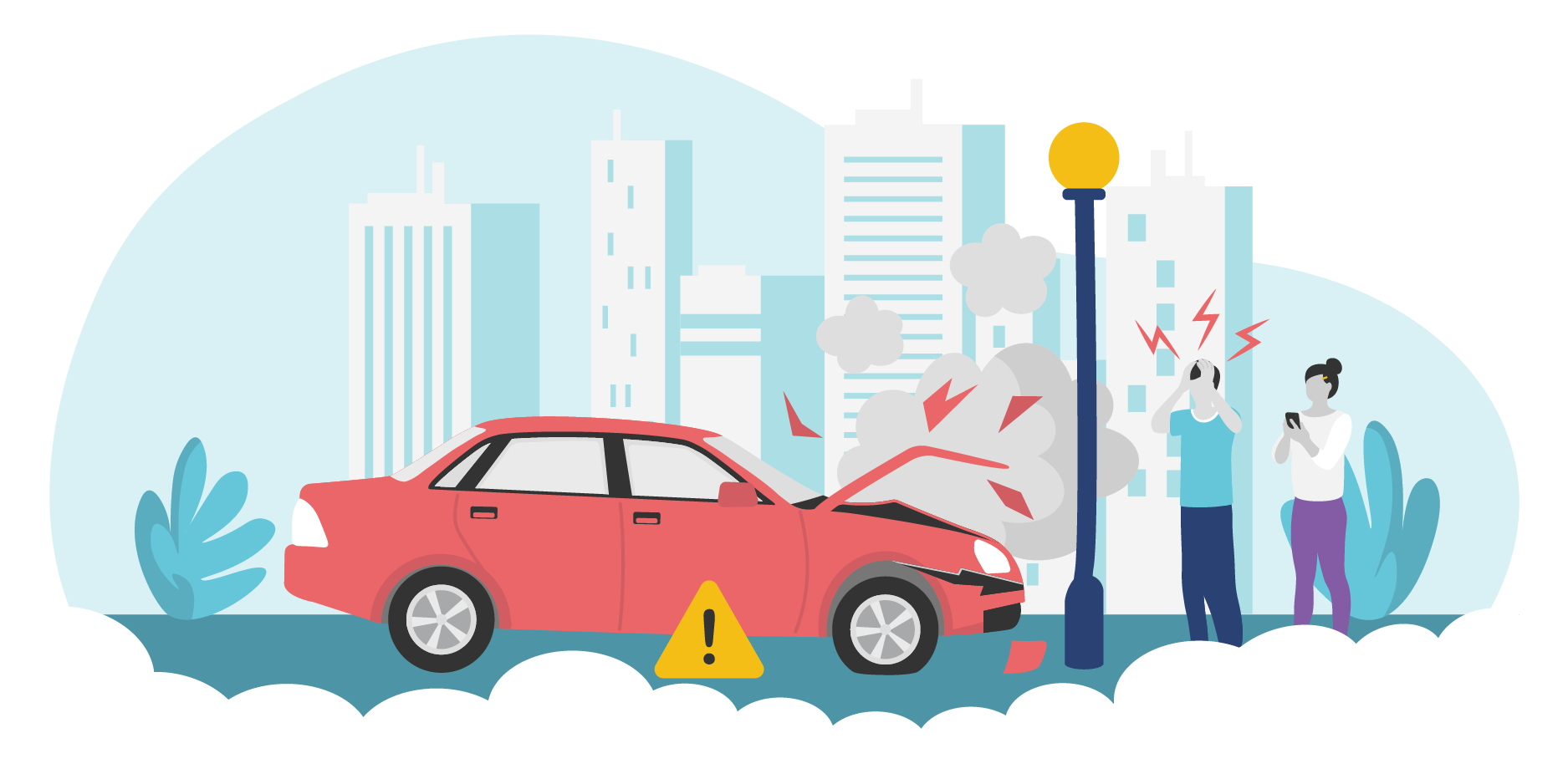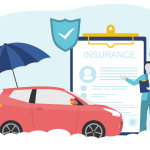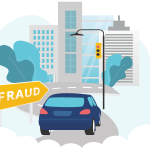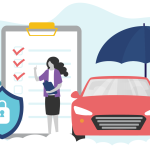Collision vs. Comprehensive Insurance: What’s the Difference?
January 3, 2023

When it comes to your car, it’s better to be safe than sorry. Even the most careful drivers aren’t immune to bad luck, and the last thing you want is the hefty bill for an unexpected repair. That’s why car owners should aim to be as prepared as possible ahead of a potential incident—and the best way to prepare? Having the right Auto Insurance coverage in place.
Whether you’re buying insurance for a new car or shopping around for your current vehicle, it’s important to know what type of policy you’re looking for. Most providers offer Collision and Comprehensive Insurance as optional add-ons to your Auto policy, but even though both coverages apply to physical damage, they cover completely different situations.

Keep reading to learn more about the difference between Collision and Comprehensive Insurance, how each coverage can protect you, and what you should consider when choosing your Auto Insurance policy.
What’s Collision Insurance?
Collision Insurance covers damages to your vehicle in the event of a collision with another vehicle or a stationary object. It’ll also cover you if your vehicle is hit in a hit-and-run—but make sure to report the incident to the police within 24 hours, as your insurer will need a record of the event.
If you live in Ontario, Quebec, Newfoundland, New Brunswick, PEI, Nova Scotia, or Alberta, the mandatory Direct Compensation Property Damage (DCPD) section of your policy will automatically cover damages to your vehicle when you’re not at-fault for a collision. However, you’ll still need to purchase Collision Coverage in order to be protected for at-fault collisions.
How can Collision Insurance help?
Here are some examples where Collision Insurance might come in handy:
1. What if you get into an accident with another car?
THE RISK:
After a long day at work, you’re stuck behind the wheel in rush hour traffic on the highway. In a momentary lapse of judgment, you fail to brake in time and rear-end the vehicle in front of you. After investigation, it’s determined that you’re the one at-fault in the incident. And while the liability coverage included in your mandatory Auto Insurance policy covers all damages to the vehicle you rear-ended, it doesn’t cover any of the damages sustained by your own vehicle.
THE SOLUTION:
With Collision Insurance in place, any damage to your own vehicle in the case of a collision will be covered, even if you’re found at-fault.
RELATED: Only 50% of Canadians Know What to Do After a Car Accident: Do You?
2. What if you lose control of your car?
THE RISK:
You’re driving along an icy path when you suddenly lose traction and swerve off the road. Unable to regain control, you end up crashing into a streetlight. No one is hurt, but your vehicle is now in dire need of repairs before it can be operated again. Unfortunately, your Auto Insurance won’t respond; in the eyes of most insurance companies, most single-car accidents are considered at-fault collisions.
THE SOLUTION:
Collision Insurance covers collisions with stationary objects, and will help pay for the repairs your car will need to get back on the road.
RELATED: 7 Steps to Get Your Car Winter-Ready
What’s Comprehensive Insurance?
Comprehensive Insurance covers damages to your vehicle that aren’t caused by collisions, such as theft, vandalism, extreme weather, and falling objects. To put it simply, this type of coverage generally protects your vehicle from events that are largely out of your control.
How can Comprehensive Insurance help?
Here are two situations that illustrate the importance of Comprehensive Insurance:
1. What if your car is stolen?
THE RISK:
You head out to spend some time in the city, leaving your car in the nearest street parking spot you could find. Later that day, you return to the spot, but your vehicle is nowhere to be found. You realize that your car keys are also missing, and you presume that your car has been stolen.
THE SOLUTION:
Comprehensive Insurance will help to cover the cost of a replacement vehicle if your car is stolen—even if you left your keys in the car, or if you simply left the car unlocked. This coverage will also apply to damages sustained in the case of attempted theft or vandalism.
RELATED: Keyless Car Thefts Are on the Rise: 10 Tips You Need to Know
2. What if your car is caught in a storm?
THE RISK:
A violent windstorm passes through the area you live in, lasting several hours. You didn’t have a chance to find indoor parking ahead of time, so your vehicle is parked outdoors for the duration of the storm. Due to the heavy winds, a nearby tree snaps and falls directly on your car, smashing through the glass of your windshield.
THE SOLUTION:
With Comprehensive Insurance, you can avoid paying the full cost of these repairs out-of-pocket; any damages sustained by your vehicle—including your windshield—due to extreme weather and falling objects will be covered.
RELATED: 5 Tips For Buying a Used Car
What’s the difference between Collision and Comprehensive Insurance?
Here’s an overview of how the two coverages compare and situations where they might apply:
Collision Insurance
- Your car hits another vehicle.
- Your car hits a stationary object, like a tree or a telephone pole.
- Your car rolls over.
- Your car is damaged by hitting a bump or pothole.
- Your car is damaged in a hit and run incident.
Comprehensive Insurance
- Your car is stolen or vandalized.
- Your car is damaged by falling or flying objects, like branches or rocks.
- Your car is damaged by an animal jumping in front of your vehicle.
- Your car is damaged by fire, explosions, natural disasters, or extreme weather events, like wind or hail.
- Your windshield is damaged from any of the above causes.
Essentially, Collision coverage only applies to damage that’s related to collisions, while Comprehensive coverage applies to damage that’s unrelated to collisions. And if you have both coverages, they’ll work together to protect your car from a variety of situations that could result in physical harm.
Another key difference? The cost. Collision coverage is typically much pricier than Comprehensive coverage. Why? Collision claims tend to be more common and more expensive than comprehensive claims, which means that insurers are taking on a bigger financial risk when offering Collision Insurance.
Do you really need Collision and Comprehensive Insurance?
If you’re leasing or financing your vehicle, Collision and Comprehensive coverage might be mandated by your lender. Otherwise, they’re optional add-ons to your Auto Insurance and at the end of the day, it’s your decision whether or not each coverage is worth it, given your personal circumstances.
If you drive an older car that isn’t worth very much, don’t drive very often, or live in a low-risk area for natural disasters or crime, you might consider dropping one or even both add-ons. But keep in mind: driving without any type of physical damage coverage comes with a big risk, since you’ll be on the hook for the full cost of damages should you be involved in an incident.
Unless you have the financial security to afford surprise costs, like repairs or an entirely new vehicle, your best option for peace of mind is to have both Collision and Comprehensive Insurance. After all, the higher your car is valued, and the more distance you drive on a regular basis, the more important it is for you to have maximum protection in your back pocket just in case.
The truth is: accidents happen, and you can’t control the weather—or the actions of people and cars around you. Collision and Comprehensive coverage are here to help you avoid breaking the bank if your vehicle does sustain physical damage in a worst-case scenario.
Need more guidance on which Auto Insurance policy is right for you? With over 40 years in business and a network of over 30 insurers, PROLINK can help you find a solution custom-tailored to your specific needs. Our experienced team of insurance advisors will offer you the advice you need to get the right coverage, from the right insurer, at the right price.
Connect with PROLINK today to learn more!
PROLINK’s blog posts are general in nature. They do not take into account your personal objectives or financial situation and are not a substitute for professional advice. The specific terms of your policy will always apply. We bear no responsibility for the accuracy, legality, or timeliness of any external content.




